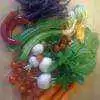-
Welcome to Celiac.com!
You have found your celiac tribe! Join us and ask questions in our forum, share your story, and connect with others.
-
Celiac.com Sponsor (A1):
Celiac.com Sponsor (A1-M):
-
Get Celiac.com Updates:Support Our Content
Interesting Article On The Correlation Between Wheat Consumption And Heart Disease
-
Get Celiac.com Updates:Support Celiac.com:
-
Celiac.com Sponsor (A17):
Celiac.com Sponsor (A17):
Celiac.com Sponsors (A17-M):
-
Recent Activity
-
0
-
- Kimmy88 commented on Scott Adams's article in Winter 2026 Issue2
-
- Kimmy88 commented on Scott Adams's article in Winter 2026 Issue8
-
- Jojer commented on Scott Adams's article in Winter 2026 Issue8
Can You Really Trust Gluten-Free Menus? What Every Celiac Needs to Know Before Eating Out
Over the last 3+ years I've had very good experiences with waitstaff being very knowledgeable about celiac in some chain and other restaurants. Some good news: I recently verified that Jack in the Box has separate fryers for breaded food and their French fries. I've had their S/W chicken salad (grilled), fries and TONS of their tacos with no ill effects...- cross contamination
- dining
- (and 8 more)
-
0
-






Recommended Posts
Archived
This topic is now archived and is closed to further replies.